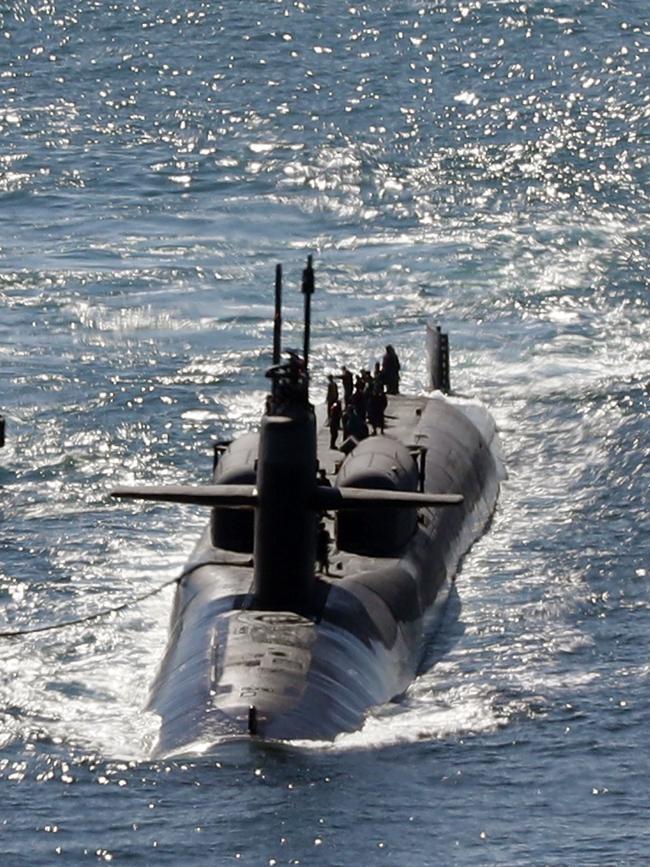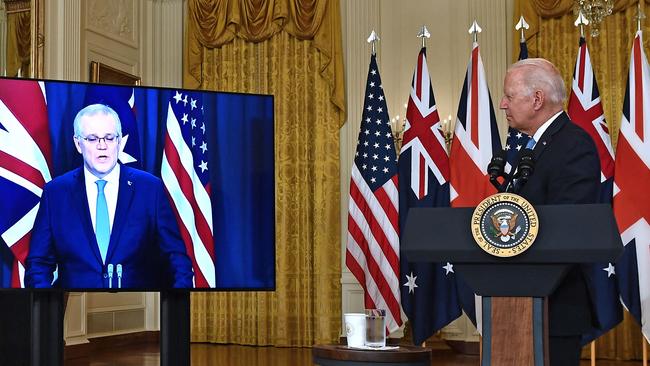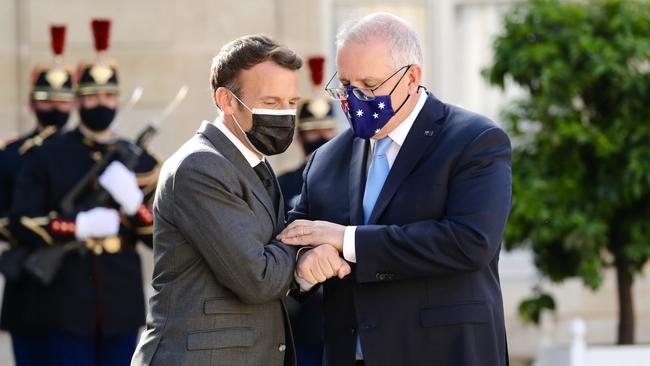AUKUS our most dramatic strategic decision in a generation

It was made possible by a perfect storm of concurrent events – the rise of a belligerent China, growing frustration with the French submarine project and a desire by the Morrison government to strengthen the alliance with the US and Britain and entwine them more closely to the Indo-Pacific.
The deal to acquire nuclear-powered submarines, made under a new pact to be known as AUKUS, was previously considered unthinkable, both politically and practically.
Both Coalition and Labor governments never held out any realistic hope that the US or the UK would share their most prized nuclear technology to make it happen. Australia did not have a civil nuclear industry and Canberra feared Australians were not ready for the debate about the issue.
Hence, when Australia held a three-way competition for its future submarine in 2016, it only included bids of evolved conventionally-powered submarines from France, Germany and Japan.

But that was then. The growing belligerence of China’s strategic rise, from its illegal hegemony in the South China Sea to its recent political retributions against Australia over a range of issues, have given new urgency to defence priorities like the new submarine project.
And yet, despite last year’s Defence Strategic Update saying that Australia no longer had a 10-year window to build its defences, the French submarine project had painfully long build times, with the first future submarine not projected to arrive until at least 2035.
The second major issue was the troubled nature of the French project by Naval Group to build 12 new conventional submarines based in Adelaide.
France was a surprise winner of the 2016 competition to build the submarines, largely because it offered a better boat for spying.
Its proposed submarine for Australia — the yet-to-be-built Shortfin Barracuda — was chosen ahead of its German and Japanese rivals because it was considered to be the quietest in the water, making it perfectly suited to intelligence-gathering operations against China and others in the region. The French also loudly touted their revolutionary pump jet propulsion system, which would have replaced propellers on its Australian boat.
But from the start, the French project hit trouble. In 2016 The Australian revealed that Naval Group suffered a massive leak of secret documents, detailing the entire secret combat capability of the six Scorpene-class submarines that the French shipbuilder had designed for the Indian navy and raised fears about the security of top-secret data on the Australian navy’s future fleet. That forced Australia to overhaul its security arrangements with Paris.
From the start, the French were also at loggerheads with Australia over cost blowouts, schedule slippages and the amount of work that would be done in Australia. France wanted more of the project completed in France than did Canberra which emphasised the need for jobs and industry in Adelaide.
As the project continued, the news became worse. The cost of the 12 new submarines jumped from $50 billion to $90 billion and the original projections by then prime minister Tony Abbott that the first submarine would be built by the mid-2020s blew out progressively to the mid 2030s.

This forced Defence Minister Peter Dutton to recently order an almost complete rebuild of the current six-boat Collins Class fleet from 2026 to try to keep them in the water into the 2030s and 2040s until the French boats were built.
The government’s frustration with the French project had become increasingly apparent this year, with Scott Morrison commissioning an independent study by Vice-Admiral Jonathan Mead and Commodore Tim Brown to examine the submarine mess and provide options for the government.
The government was under growing time pressure because it was on the verge of signing a contract with Naval Group to proceed with the next phase of the project. To have signed this deal would have made it far harder and more expensive for Australia to reverse course on the program.

Even so, as recently as June, Morrison declared after a meeting with French President Emmanual Macron, that the French project was back on track.
At that time, Morrison also held a three way meeting with Joe Biden and Boris Johnson in which it appears that the current nuclear deal was almost certainly discussed.
Once Morrison knew he had the backing of the US and the UK to help Australia build its own fleet on nuclear-powered boats, then the equation for the government changed dramatically.
Nuclear-powered boats were always considered much better for Australia’s strategic circumstances than conventional boats which are slower, have less range and need to come up for air. While conventional boats can go closer into shallow waters, giving them useful eavesdropping advantages, the tyranny of distance always worked against Australia’s conventionally-powered submarine fleet. That is why we have always had to build one-of-a-kind large submarines like the Collins and – until today – the French boats, which have consistently led to absurd costs, technical problems and schedule delays.
Morrison has deftly avoided – or at least delayed – the nuclear debate in Australia by stating that Australia will not build its own civil nuclear industry to help support the submarines. This is a position which may change in the years ahead, as Australians get a better understanding of nuclear power and become less resistant to the idea of a local nuclear industry. He has also avoided the political risk of losing shipbuilding jobs by stating that the submarines will be built in Adelaide, rather than imported from the US or the UK.
But it does place Australia firmly in the hands of the US and the UK in this new venture. Canberra will rely utterly on its major allies to build its new submarines and sustain them over their lifetime. That is not necessarily a bad thing and it will help to keep the US especially more closely entwined with Australia’s strategic priorities in the Indo-Pacific. There are numerous questions which remain unanswered about this ambitious project. But for the first time, Australia now has the opportunity to skip a generation and acquire nuclear-powered submarines which are perfectly suited to its geography and which will be a far more formidable foe for China or any other adversary.
There will be many bumps and challenges along this journey, but for the first time in a long time, an Australian government has made a decisive and positive decision about its maritime security. It will finally get nuclear-powered submarines while at the same time strengthening its relationship with our closest allies. China will not be happy, but history will record this momentous decision well.







The decision to acquire nuclear-powered submarines and scrap the $90 billion French deal is Australia’s most dramatic and far reaching strategic decision in a generation.